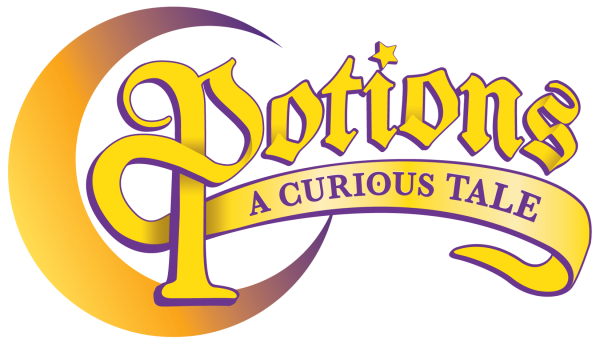Hello dear readers, today we are going to do something a little different. The first in a new series of staff profiles of our writers and editors, Renee Gittins, Creative Director, CEO at Stumbling Cat and Onsite Reporter for Brokenjoysticks.net.
F: So Renee, what got you started on gaming, first system and first game?
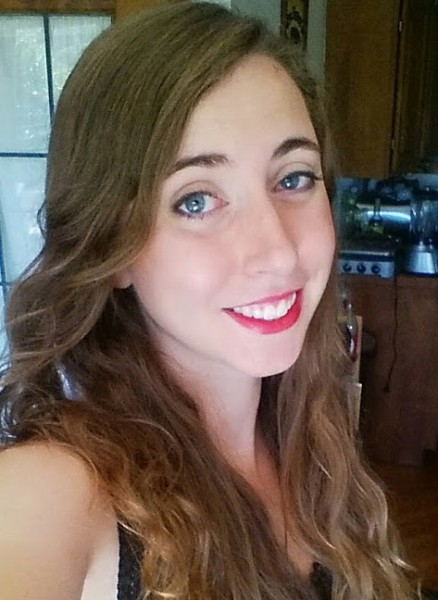 R: The first game I ever played was Wolfenstein 3D on DOS. First person shooters on the PC were really my introduction to video games. I played both Doom and Duke Nukem 3D on PC long before touching a console.
R: The first game I ever played was Wolfenstein 3D on DOS. First person shooters on the PC were really my introduction to video games. I played both Doom and Duke Nukem 3D on PC long before touching a console.
F: Ok, what is your favorite game of all time?
R: That’s such a hard question and I don’t have an answer that I’m happy with! Certainly, as a child, Half-Life was my favorite game. I just have so many good, fun memories associated with that whole series! Recettear is one of my favorite games, though it is so different from most of the games I play. It influenced so much that it was one of my main inspirations in developing Potions: A Curious Tale.
However, right now, I think that Overwatch is my favorite game (even if I can’t play it currently). Since I started working from home, games with social elements really draw me in. Plus, I started on FPS games and I was a big MOBA player for a while, so I love how Overwatch combines elements of both of those!
F: You talked about social elements, and I know you are a long time MMO gamer how do you think massive multiplayer games have effected you and your life?
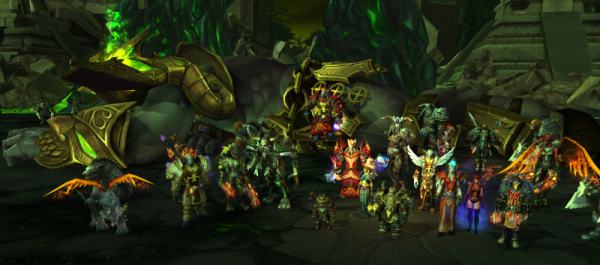
R: Oh, MMOs definitely have affected me so much throughout my life. When I was younger, I was an awkward girl that had trouble making friends. The rise of the internet and MMOs gave me a new medium in which I could work on developing my sense of identity in an environment without the biases of the peers who already knew me. I think they really helped me find myself and practice social interactions. While I’m so often know now as a super social, extroverted person, I really think it was MMOs that helped me get there! Plus, I’ve been in the same wonderful guild in WoW for the last eight years. They have been a huge support for me over those years and I definitely don’t think I would be where I am now without them.
F: Did you ever think you would be making games? What about writing about them while writing them?
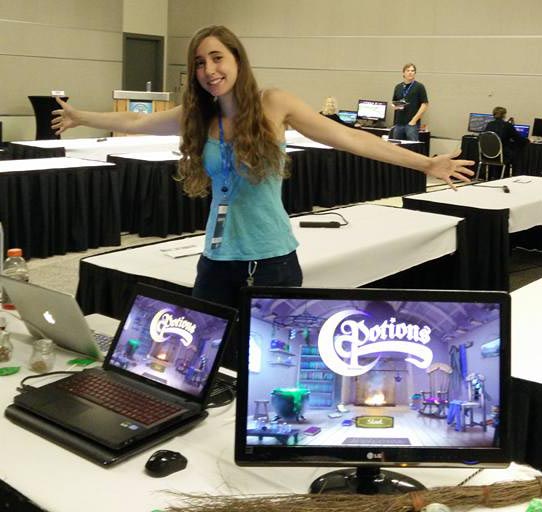
R: I certainly had absolutely no clue I would be making games until I started making them! I just didn’t consider it a possibility and I wonder what would have happened if someone had introduced me to programming and game development earlier in life.
As for writing about games, I think I could see that developing over the years. I actually ran a fairly popular blog on Team Liquid for a while and often wrote game reviews on it and just general commentary on the gaming community. I had a ton of fun with those blog posts, but I am much happier to be now writing in a more formal setting.
F: So in our recent podcast with you you revealed that your game, you and your cats, are being featured in a documentary series, whats that like?
R: I am very proud and pretty nervous! I am definitely excited to have my game and my story shown to so many people. However, with the rise of targeted harassment of female game developers, the sudden exposure also makes me wonder if I will become a target for my beliefs. Of course, I worry about my game being shown in a positive light, too!
F: How proud are you of the game and how far it’s come?
R: I am very proud of Potions and how far the game has come in just a year. I also see so much more that I want to do with it, so there is really an insatiable hunger to improve and expand it! I guess a developer is never fully satisfied with their game!
F: What’s the hardest part of being both a games reporter and a game developer?
R: Time! There is never, ever, ever enough time or energy to create and write what I want to! As they say, time is the most valuable resource and I definitely feel that way. It seems like I always have some function to program, someone to meet with or something to write! However, that does mean that I’m never bored!
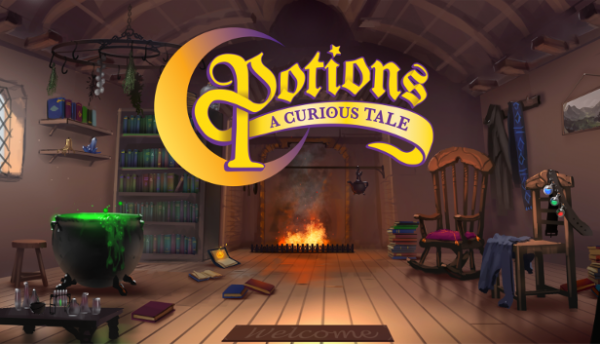
F: What are your hopes for Potions? Do you want to keep going with the project or do you think it was more of an initial foray that will lead to more games and more development work?
R: I started Potions as a way to experience leading the development of a large game. I wanted to see if I had the chops not only to design, but to also program the game and manage a team. I never really expected for it to come this far, I just didn’t know if I could do it, but now I really hope that I can see the game to its end.
F: You live with another developer (Matt) who works on an Oculus title; do you ever throw concepts back and forth around between you? Or is work at work and home at home?
R: We try to keep it semi-separated, but we enjoy sharing and providing feedback for each other’s creations. We also help each other more in depth as well. I’ve helped his company with press relations, testing and community management, while he’s helped me with some panicked bug fixes before major events. Unfortunately, we both have lots of work to get done, so some of it ends up being done at home.
F: You have cats right? The internet loves cats, can we have some pictures of your cats? Do they help you code? I know they sleep on the desk right next to the keyboard.
R: I do have cats! Two cats, in fact! One is named Fiddle, he is a very stereotypical cat. He’s a little standoffish and very scared of new people. Still, he generally likes being in the same room as me, even if he stays always just out of reach. My other cat is Calcifer, he’s my furry little child. I work with him either sleeping on me or trying to sleep on my keyboard. He’s hyper and needy; we even play chase around the house! But we’ve figured out a good arrangement so that I can still code and work while he is snuggle up against my chest.
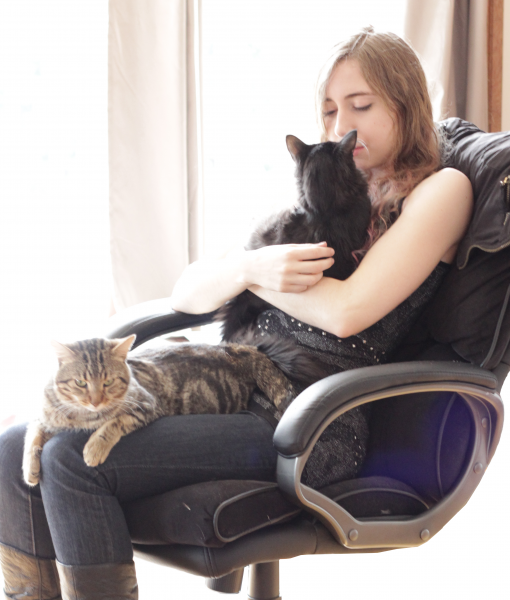
F: What’s it like to work from home and not have a schedule? Did you create a schedule with deadlines?
R: I worked without a schedule for the first few months of Potions. Unfortunately, I found myself overworking, getting burnt out, and then feeling bad about not working enough. It lead to lots of self-doubt and low productivity. Since then, I implemented a tentative work schedule (11am-7pm, Mon-Fri) and it has helped greatly. Often times I start working before 11am, but I allow myself to take breaks when I need and just having a schedule really helps me stay focused and let other people know when I’m busy.
Actually, a big issue in regards to time management is my friends and family seeing me working from home meaning that I have free time whenever I want. While that is technically true, allowing people to interrupt my planned work schedule is awful for productivity. Having a set schedule allows me to decline those invitations more easily.
Another big issue about working from home is the lack of social interaction. I used to take for granted how much I appreciate having small, casual human interactions in my life. Working from home, I started feeling “off” a lot until I went out with friends. It helped me realize that I really do need some human interaction here and there to be happy, so I’ve made sure that’s part of my weekly schedule, and I’m much happier for it!
F: You have assembled quite the team (STUMBLING CATS ASSEMBLE), where did you find all of those folks to help you out?
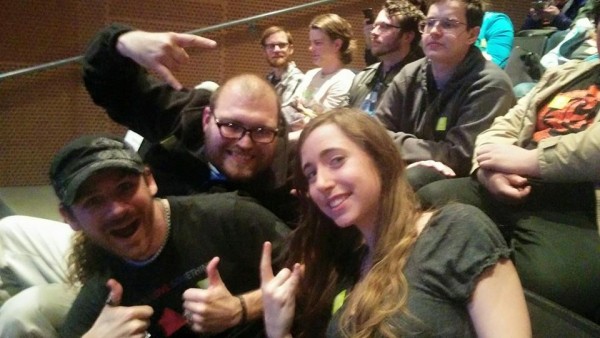
R: Every single person on my team I found in a different way. I found my environment artist, Jake, through his response to an online post posting I put out in /r/GameDevClassifieds. My audio magician, Joshua, I met at a Seattle game dev meet-up at a studio that used to be in the area. My character artist and animator, Wesley, actually found and contacted me about his interest when he saw my work. My writer, David, is an old friend of mine that used to write for Riot and Carbine (and now is at Ready at Dawn). I love my team, they are all really wonderful people and I consider myself extremely lucky to have found each and every one of them!
F: You do a lot of volunteer work, how does that tie in with your work? I assuming that giving back is important.
R: I volunteer as a mentor for Foundry10, a local non-profit founded by Gabe Newell, his wife and the CEO, Lisa Castaneda. Foundry10 does research and provides programs and outreach to redefine education. It’s really a marvelous organization that provides students the tools and resources to learn about their interests in a setting that allows them to get hands-on with the subject. I mentor students in programming and game development.
Truthfully, mentoring there is often the highlight of my week. I love seeing students so passionate about game development and it is really great to help them learn about everything from coding monster AI to project planning. Seeing these students grow is really inspirational and, also, while instructing them, I am reminded about the core concepts of game development. If I am telling my students about the importance of finishing the core parts of the game before expanding the scope, it makes me think about whether I am applying the same advice to my own work. It can be quite humbling!
I also volunteer as a member of the Seattle chapter board of IGDA (the International Game Developers Association). I plan events and help provide resources for local game developers and game development students, from job fairs to talks from local industry professionals to networking events. The Seattle game development community has done so much for me over the last two years, so I am really happy to give back to them!
F: You started your project, Potions: A Curious Tale, at a very troubling time for women in games, did that make you question your decision to develop your game? How do you feel about being a woman in the game industry?
R: Yes, it just so happens that I started working on Potions: A Curious Tale the same month that GamerGate started. At first, it seemed like a one-off pile of craziness that one would expect from the less savory side of the internet. It was concerning to watch the number of victims and the harassment grow as my own project was developing. I’ve been using the Internet ever since I could first get my hands on it at my local library while I was still in elementary school, so I thought that my internet usage habits were pretty set. However, I found myself increasingly worried about the protection of my own personal information and that of my friends, so I have changed a lot of my previous habits. I am more careful about what I say publically, I have additional security measures on all of my accounts and I am more wary about strangers on the internet in general.
Of course, I have been using the internet for fifteen years now, so I am no stranger to online harassment. It’s even gone so far that I’ve had death threats called to my personal cellphone. One year, a group of men who disliked me on WoW even threatened to come to Blizzcon and physically assault me when they learned that I was going to be attending.
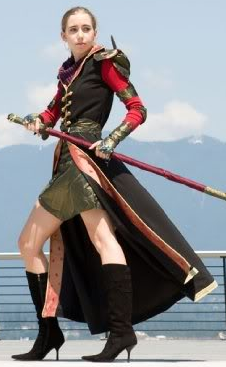
Unfortunately, over the years, I have learned how to behave in a way online that discourages harassment and deflect attention away from my gender. It troubles me that I have had to take such measures just because of my gender. At this point, I can’t tell if it is actually getting better or if I just avoid and deflect so much that I avoid some of the harassment that would be present if I acted differently.
In regards to being a woman in the game industry, though, I do find there to be some innate sexism. While I do all of the design, programmer and business development for Potions, most people assume I’m an artist. I’ve quite literally had a conversation that went:
Them: Who is all on your team?
Me: On my core team I have two artists, one does environment art and one does character art and animation, an audio engineer, and I do everything else.
Them: So who does the programming?
It is so common to have my technical abilities doubted or for people to assume that I don’t run the development team or program that I can’t even find myself upset about it. The stereotyping over my gender is just astonishing; especially due to how often it happens by kind, inquisitive people, who obviously don’t mean to offend. It’s like they can’t even imagine a female programmer or team lead.
While I haven’t faced direct discrimination, when people react that way to me and my skillset, it makes me wonder how many times my resume has been passed up for a technical position because my name is “Renee” and not “Rene”.
F: How long have you been attending cons?
R: I’ve been attending conventions since I was about 13 years old (that’s 12 years!). My first convention ever was an anime convention called Sakura Con. It was that convention that really got me into cosplay, which is a hobby of mine, when I can find the time!
I didn’t attend my first game convention until 2008, which was Blizzcon. It had a completely different vibe from anime conventions, which really shocked me at first. Anime conventions are full of bright costumes, cheery people and a good balance between men and women. Blizzcon was the first convention I attended where they main convention hall lights were kept off, which made it feel very dark. Almost no one was wearing any costumes, the majority of attendees were men that were older than me and people were not as interested in socializing. I still had a blast, but it was quite the change of pace!
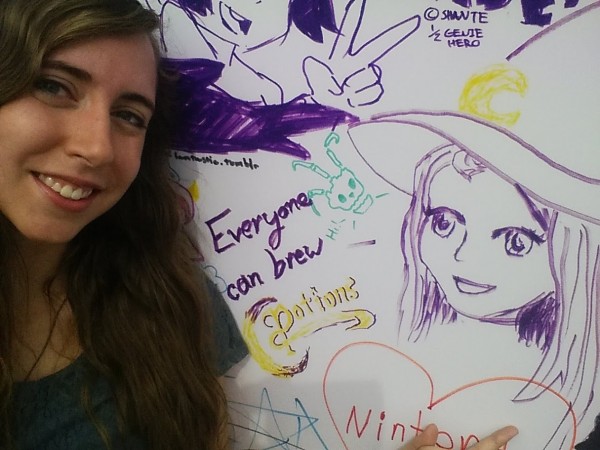
F: You attended two cons this with your game to show it to the world, what was the reaction like? How did that make you feel?
R: Actually, this past year I’ve showed Potions: A Curious Tale at four conventions! Power of Play, PAX Prime, Geek Girl Con and IndieCade! At Power of Play, I realized how important it is to introduce mechanics to people slowly; giving them a card with the controls and throwing them into the middle of the game is overwhelming. The next time I presented my game (at Intel’s Buzz Workshop) I had a tutorial, but it was all signs and people found it boring. I was hoping to avoid making a huge integrated tutorial that I was going to throw out later, but then realized that it was really necessary and would be valuable.
I worked really hard to get a fully integrated and interested tutorial in the demo for PAX Prime and the results were astounding. Almost no one was confused about how to play the game. Since the story was introduced over more time, people were more interested in continuing to play and the majority of people completely finished the demo. It was so inspiring to watch how much people’s interactions with the game changed without changing any of the mechanics of the game itself. It really showed me how important design is when it comes to presenting the game and its mechanics.
Though I’ve been working on building out other sections of the game which are not in the demo, I was also very inspired by the reactions Potions received from women and girls at Geek Girl Con. While some young women had played the game at PAX Prime and loved it, the attention Potions got at a convention for female geeks really made me realize how much this game appeals to other women. I realize that I made Potions as a game that I knew that I would enjoy, but I didn’t realize until then how much my gender had influenced the art style, story and characters. It was just so inspirational to see the amount of interest and enthusiasm over Potions. It made me really feel like I was making a game that other people would not just enjoy, but a game that they would love.
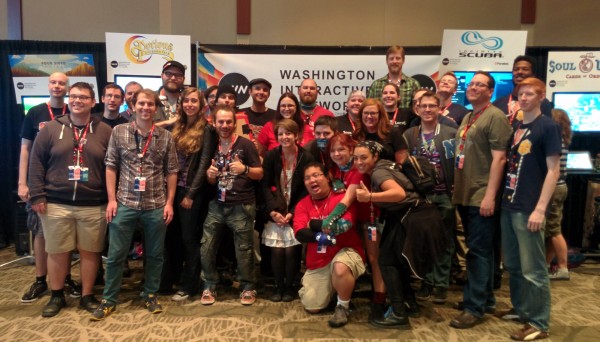
F: Who is your inspiration, not just for this game, but in life in general?
R: I find inspiration in so many places and from so many people! I have some wonderful friends in the game industry that I look up to. Rami Ismail, with his support of game development communities around the world, and his work to encourage diversity and culture understanding, has inspired my work with students as well as the inclusion of folklore from around in the world in Potions. I hope to be as good as him at business development one day, too!
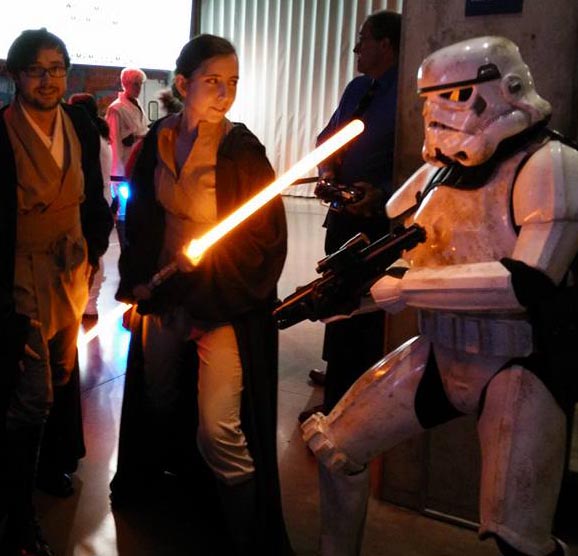
Ty Taylor, a brilliant game designer, and his games, The Bridge and Tumblestone, have made me rethink how I approach puzzle design in Potions and The Bridge in particular was a huge inspiration for my Ludum Dare 34 game, Dryad.
Matt Endsley, who helped me found Stumbling Cat, is one of the best programmers that I know and he is also one of the most grounded game developers I know. I hope to emulate his development approaches to make Potions as clean and well running as AirMech and AirmechVR.
John Comes, a Creative Director at Uber Entertainment, and his down-to-earth business sense combined with his design and programming skills inspire me to follow a similar path. I see a lot of what I would like to do in his work and his interactions with his team.
And, finally, the biggest inspiration in my life is my parents. I admire them both greatly and I hope that I can build my path through life as successfully as they have. My father, despite the hardships he has faced over his life, is kind and charismatic and the hardest worker that I have ever met, but he always puts his family first. My mother and her dedication to her creativity and her strength in the face of men doubting her abilities because of her gender has helped me face the same doubts directed at me.
I am very lucky to have these people in my life and the countless others who provide both inspiration and support for me on this tumultuous journey.
F: Do you enjoy writing for Broken Joysticks?
R: Yes! I absolutely love writing and especially about video games and the industry. The team at Broken Joysticks has been extremely kind and supportive. I find them to be a wonderful group of people to work with and I plan to continue to do so indefinitely. It is wonderful not only to stretch my writing skills and be able to write about subjects at interest me, but to do so in such a supportive environment.
